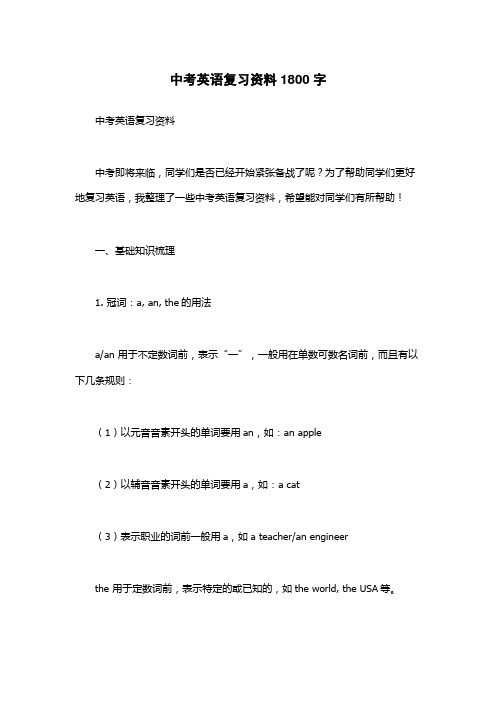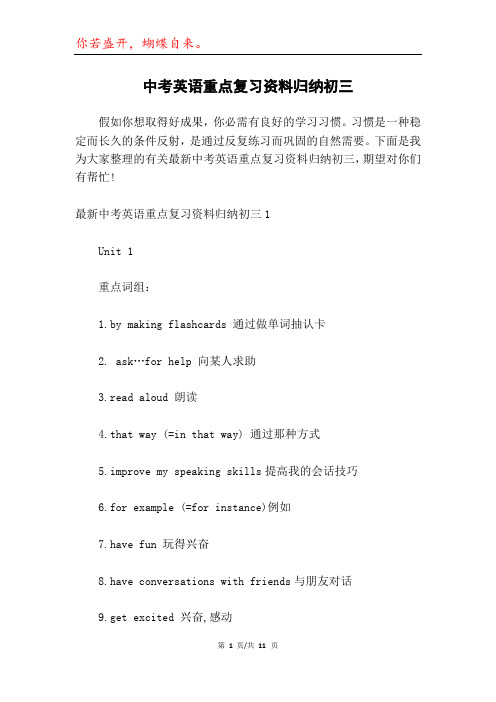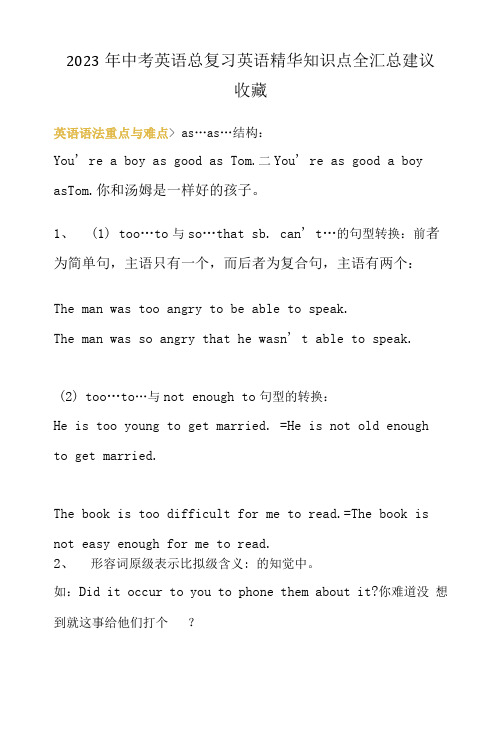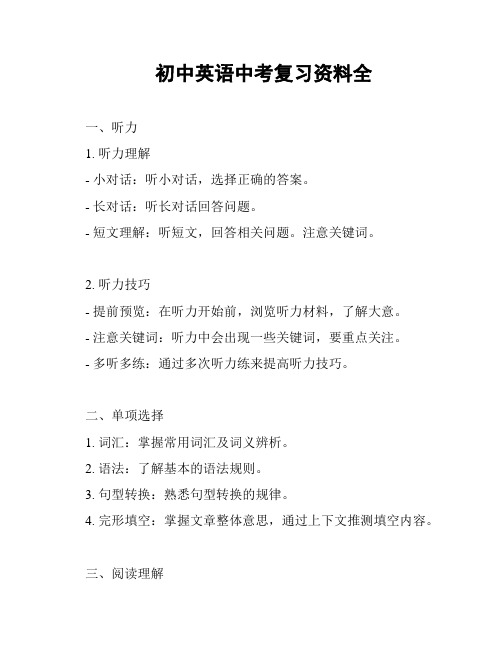最新推荐中考英语总复习资料总汇(完美版)
中考英语复习资料

中考英语复习资料1800字中考英语复习资料中考即将来临,同学们是否已经开始紧张备战了呢?为了帮助同学们更好地复习英语,我整理了一些中考英语复习资料,希望能对同学们有所帮助!一、基础知识梳理1. 冠词:a, an, the的用法a/an 用于不定数词前,表示“一”,一般用在单数可数名词前,而且有以下几条规则:(1)以元音音素开头的单词要用an,如:an apple(2)以辅音音素开头的单词要用a,如:a cat(3)表示职业的词前一般用a,如a teacher/an engineerthe 用于定数词前,表示特定的或已知的,如the world, the USA等。
2. 人称代词和物主代词:I, you, he, she, it, we, they和my, your, his, her, its, our, their的用法。
人称代词主格宾格单数 I meyou youhe himshe herit it复数 we usthey them物主代词形容词性物主代词名词性物主代词单数 my mineyour yourshis hisher hersits its复数 our ourstheir theirs3. 数词:基数词和序数词基数词表示数量,“one, two, three, four…”,序数词表示次序,“first, second, third, fourth…”4. 时态:1)一般现在时:主语+动词原形。
常用时间状语:always, usually, often, sometimes, never等。
2)一般过去时:主语+动词过去式。
常用时间状语:yesterday, last night, ago等。
3)一般将来时:主语+will+动词原形。
常用时间状语:tomorrow, next week, in the future等。
4)现在进行时:主语+be(am/is/are)+动词的ing形式。
中考英语重点复习资料归纳初三

中考英语重点复习资料归纳初三假如你想取得好成果,你必需有良好的学习习惯。
习惯是一种稳定而长久的条件反射,是通过反复练习而巩固的自然需要。
下面是我为大家整理的有关最新中考英语重点复习资料归纳初三,期望对你们有帮忙!最新中考英语重点复习资料归纳初三1Unit 1重点词组:1.by making flashcards 通过做单词抽认卡2. ask…for help 向某人求助3.read aloud 朗读4.that way (=in that way) 通过那种方式5.improve my speaking skills提高我的会话技巧6.for example (=for instance)例如7.have fun 玩得兴奋8.have conversations with friends与朋友对话9.get excited 兴奋,感动10.end up speaking in Chinese以说汉语结束对话11.do a survey about… 做有关…的调查12.keep an English notebook 记英语笔记13.spoken English (= oral English) 英语口语14.make mistakes 犯错误15.get the pronunciation right 使发音精确16.practise speaking English 练习说英语17.first of all 首先18.begin with 以…开头ter on 随后20.in class在课堂上ught at 称赞22.take notes 记笔记23.enjoy doing 喜爱干…24.write down 写下,登记25.look up (v + adv) 查找,查询26.native speakers 说本族话的人27.make up 编造,虚构,化妆,装扮28.around the world 全世界29.deal with 对待,处理,解决30.worry about (be worried about) 担忧,担忧31.be angry with 生某人的气32.stay angry 生气33.go by 消逝34. regard…as… 把…当做…plain about/of 埋怨36. change…into… 把…变成… (= turn into)37.with the help of 在…的帮忙下38. compare…to (with)… 把…和…作比较39.think of (think about) 想起,想到40.physical problems身体上的问题41.break off 中断,突然终止42. not…at all 根本不,全然不Unit 2 重点词组:1. be more interested in 对…更感爱好.2. on the swim team 游泳队的队员.3. be terrified of 可怕.4. gym class 体操课.5. worry about. 担忧.6. all the time 始终, 总是7. chat with 与…闲聊8. hardly ever 几乎从不9. walk to school = go to school on foot take the bus to school = go to school by bus 步行去学校10. as well as 不仅…而且11. get into trouble 遇到麻烦12. make a decision 做出打算13. to one’s surprise 使某人惊讶的是14. take pride in 为…感到傲慢15. pay attention to 留心, 留意16. consist of 由…组成/构成.be made up of 由…组成/构成.17. instead of 代替, 而不是18. in the end 最终, 最终19. play the piano 弹钢琴Unit 3 重点词组:1. be allowed to do sth 被允许干…allow to do sth 允许某人干…allow doing sth 允许干…2.sixteen-year-olds = sixteen-year-old boys and girls 16岁的孩子3. part-time jobs 工作4. a driver’s license 驾照5. on weekends 在周末6. at that age 在那个年龄段7. on school nights 在上学期间的每个晚上8. stay up 熬夜9. clean up (相当与及物动词) 清扫10. fail (in) a test 考试不及格11. take the test 参与考试12. the other day 前几天13. all my clasates 我全部的同学14. concentrate on 全神贯注于15. be good for 对…有益16. in groups 成群的,按组的17. get noisy 吵闹(系表结构)18. learn from 向某人学习19. at present 目前,现在20. have an opportunity to do sth有做…的机会21.English-English dictionary英英词典22. at least 至少23.eight hours’ sleep a night每晚8小时的睡眠24. an old people’s home 敬老院25. take time to do sth 花费时间干…26. primary schools 学校27. have…off 放假,休息28. reply to 回答,答复29. get in the way of 阻碍30. a professional athlete 职业运动员31. achieve one’s dreams 实现幻想32. think about 思索,考虑33. in the end 最终,最终34. be serious about 对…热忠/极感爱好35. spend…on + n. spend …(in) + v-ing在…上花费时间/金钱36. care about 关怀,担忧,在乎37. agree with 同意…最新中考英语重点复习资料归纳初三21. not at all =not in the slightest 根本不2. end up (doing sth ) 结束(做某事)3 .make a mistake/mistakes in sth 在某方面出错4 .later on 随后5. be afraid to do sth 可怕做某事be afraid of doing sth/sb 可怕……6. laugh at sb 称赞某人7. take notes=write down the notes 做笔记8 .map 组成9 .deal with=do with 处理10. be angry with 对……感到生气11 .go by (时间)过去、消逝Time goes by. 时间消逝12. try one’s best to do sth 尽某人努力做某事13 .break off 突然终止;中断14. make flashcards 制作抽认卡15. make a vocabulary list 制作词汇表16 .read aloud 大声读play the CD too loud 把CD放开大声17. practice doing sth 练习做某事18. get the pronunciation right=pronounce right发音精确19 .specific advice/suggestions 具体而精确的建议20. memorize/recite the words 背单词21. read the textbook 读课本22 .English grammars 英语语法23 .feel differently 觉的不同24. frustrate sb = make sb frustrated 使某人懊丧find sth frustrating 发觉某事懊丧25. get/be excited about 感动look excited 看起来很感动an exciting match/game 一场刺激的竞赛26 .spoken/oral English 英语口语27 .regard... as 把…... 当成/看作regard sth as a challenge 把某事视为挑战28. impress sb 感动某人be impressed 被深深感动be impressed by sb 被某人感动;对...印象深刻29.have trouble/difficulty(in)doing sth= have trouble/difficulty with sth 做某事有困难30. look up the words in a dictionary用字典查阅单词你若盛开,蝴蝶自来。
(完整版)[全套]初中英语中考复习资料,推荐文档
![(完整版)[全套]初中英语中考复习资料,推荐文档](https://img.taocdn.com/s3/m/a026d6c090c69ec3d4bb7565.png)
每天练一练
爱拼才会赢
词,所以它具有单数形式和复数形式两种。可数名词复数形式的构
成规律是:
1.
一般情况加 s,如:pen—pens, doctor—doctors,boy—boys,其
读音规则是在清辅音后读[s],在元音和浊辅音后读[z]。
tomatoes,hero—heroes;photo—photos,radio—radios,piano—pianos 6. 以 f 或 fe 结尾的名词的复数形式要将 f 或 fe 变为 v 再加 es,如:
knife—knives, leaf—leaves, 但有些例外的词如 roof 的复数形式是 roofs。
如:factory—factories,country—countries, family—families.但要注意
的是以元音字母加 y 结尾的名词的复数形式只加 s,如:boy—
boys,day—days。 5. 以 o 结尾的名词的复数形式一般要加 es,但如果 o 前面是元音
字母或外来词,缩写词以 o 结尾的则只加 s,如:tomato—
的变化,其主格可作主语,宾格可作宾语。还有所有格,用来表示
人或物的所有,以及领属关系。表示有生命的名词的所有格其单数
形式是加's 其复数形式是 s',如其结尾不是 s 的复数形式仍加's,如:
a student's room, students' rooms, Children's Day.在表示时间、距离、
每天练一练
爱拼才会赢
[析]可数名词前应用 many, few, a few, a lot of 来修饰,而 people 是可数名词,而且是复数名词,如:The people are planting trees here. [误]I want a few water. [正]I want a little water. [析]不可数名词前可以用 a little, little, a lot of, some 来修饰,但 不可用 many,few 来修饰。 [误]Thank you very much. Your family is very kind to me. [正]Thank you very much. Your family are very kind to me. [误]Tom's and Mary's family are waiting for us. [正]Tom's and Mary's families are waiting for us. [误]I'm sorry. I have to go. Tom's families are waiting for me. [正]I'm sorry. I have to go. Tom's family are waiting for me. [析]集合名词如果指某个集合的整体,则应视为单数,如指某个 集合体中的个体则应视为复数。如:My family is a big family. When I came in, Tom's family were watching TV. 即汤姆一家人正在看电视。 这样的集合名词有:family class, team 等。 [误]Don't eat too much meats. [正]Don't eat too much meat. [误]Food in that restaurant is very good. [正]The food in that restaurant is very good. [析]物质名词是不可数名词,在使用中不可以加 s,即它没有复 数形式。也不可加不定冠词。但如果用于特指某一物质时可以加定 冠词。如:I don't like drinking coffee, but the coffee in that cup is really good. [误]Please give me two waters. [正]Please give me two glasses of water. [正]Please give me two coffees. [析]物质名词如要加计量时,一定要加量词,如:two cups of tea,two glasses of water,a glass of milk,a loaf of bread, a piece of bread,a box of sugar, a bowl of rice,a bottle of orange, a bag of earth
2023年中考英语总复习英语精华知识点全汇总建议收藏

2023年中考英语总复习英语精华知识点全汇总建议收藏英语语法重点与难点> as…as…结构:You' re a boy as good as Tom.二You' re as good a boy asTom.你和汤姆是一样好的孩子。
1、(1) too…to与so…that sb. can' t…的句型转换:前者为简单句,主语只有一个,而后者为复合句,主语有两个:The man was too angry to be able to speak.The man was so angry that he wasn' t able to speak.(2)too…to…与not enough to句型的转换:He is too young to get married. =He is not old enough to get married.The book is too difficult for me to read.=The book isnot easy enough for me to read.2、形容词原级表示比拟级含义: 的知觉中。
如:Did it occur to you to phone them about it?你难道没想到就这事给他们打个?事件作主语时,happen和occur可以通用?如:The accident happened/occurred yesterday. 事故是昨天发生的。
take place指事件发生,但常用来表示“举行”的意思,带有非偶然性?如:The meeting took place last night.会议昨晚举行。
14.in front of, in the front of in front of的意思是“在前面”。
如:There is a tree in front of the house.房子前面有一棵树。
(366页)最新中考英语全套复习资料(语法、词组、句型、作文及知识点大全) [全国通用] 附阅读理解题型答题
![(366页)最新中考英语全套复习资料(语法、词组、句型、作文及知识点大全) [全国通用] 附阅读理解题型答题](https://img.taocdn.com/s3/m/a10adc939ec3d5bbfd0a7461.png)
(366页)最新中考英语全套复习资料(语法、词组、句型、作文及知识点大全) [全国通用] 附阅读理解题型答题技巧讲解[衡中内部资料,限制传阅]复习第二轮使用(按语法知识点逐项讲解,请教务处复印给同学们)一名词(一) 知识概要名词的概念在不同的语法教课书中有不同的解释和分类方法,但就实际应用来讲还是不要过分地追求其理论概念,而更多的要把注意力放在其应用上来。
我们不妨把它分为两大类:专有名词与普通名词。
顾名思义,专有名词是指:个人、事物、机关等所专有的名称,如,the Great Wall,America…它们是不能随意变动的。
而普通名词中则包括个体名词,如pen, worker…它表示单一的个体人或事物;集体名词,如:family,class,team,它表示的是由若干个个体组成的集合体;物质名词,如:water,paper…它表示的是一种物质,原材料;而后一种是抽象名词,如:work, time…它表示着一种在实际生活中看不见、摸不到,但却与实际生活紧密相关的某些动作、状态、品质的抽象概念。
见下表。
名词一览表种类专有名词London, John, the Communist Party of China普通名词类名词nurse, boy, worker, pencil, dog, table集体名词class, family, army, police, team, people物质名词water, steel, glass, cotton, wood, sand抽象名词happiness, love, work, life, courage, honest功用主语My family is now in New York.表语His father is a scientist.宾语We love our great motherland.宾语补足语He made London the base for his work.定语The girls are making paper flowesrs.状语The car cost him 1000 dollars.同位语Mr Brown, a famous scientist, will come here.名词在使用中的难点在于名词的数,即可数名词与不可数名词的实际应用。
初中英语中考复习资料全

初中英语中考复习资料全
一、听力
1. 听力理解
- 小对话:听小对话,选择正确的答案。
- 长对话:听长对话回答问题。
- 短文理解:听短文,回答相关问题。
注意关键词。
2. 听力技巧
- 提前预览:在听力开始前,浏览听力材料,了解大意。
- 注意关键词:听力中会出现一些关键词,要重点关注。
- 多听多练:通过多次听力练来提高听力技巧。
二、单项选择
1. 词汇:掌握常用词汇及词义辨析。
2. 语法:了解基本的语法规则。
3. 句型转换:熟悉句型转换的规律。
4. 完形填空:掌握文章整体意思,通过上下文推测填空内容。
三、阅读理解
1. 标题理解:快速浏览文章,找出文章的主旨。
2. 细节理解:仔细阅读文章,找出特定细节。
3. 推理判断:根据文章内容进行推理判断。
4. 表达态度:理解文章作者的观点和态度。
四、写作
1. 书面表达:掌握合适的表达方式和句子结构。
2. 话题写作:对于给定的话题,能够展开合理的写作内容。
五、口语交际
1. 日常交际:熟练掌握日常用语表达。
2. 问答对话:能流利且准确地进行问答对话。
六、应试技巧
1. 时间安排:合理规划考试时间,合理分配各个部分所需时间。
2. 注意细节:注意题目的要求和限制条件。
3. 充分准备:提前复并进行模拟练。
以上是初中英语中考复的一些重点内容和技巧,希望对你的复
有所帮助。
(精编)初中英语总复习资料汇总
(精编)初中英语总复习资料汇总一、词汇复1. 名词复数形式- 单数变复数:在名词末尾加s或es。
- 不规则变化:例如,child→children,man→men。
2. 动词时态- 一般现在时:表示经常发生的动作或客观事实。
- 现在进行时:表示现在正在进行的动作。
- 一般过去时:表示过去的某个时间发生的动作。
- 过去进行时:表示过去某个时间正在进行的动作。
3. 形容词比较级与最高级- 一般形容词在词尾加-er形成比较级,再加-est形成最高级。
- 以字母e结尾的形容词,直接加-r形成比较级,再加-st形成最高级。
- 不规则变化:例如,good→better→best,bad→worse→worst。
二、语法复1. 句型结构- 主语+谓语:例如,I like English.- 主语+谓语+宾语:例如,She reads books.- 主语+谓语+间接宾语+直接宾语:例如,He gave me a gift.- 主语+谓语+宾语+宾语补足语:例如,We elected him president.2. 时态转换规则- 现在时态转一般过去时态:动词末尾加-ed。
- 现在时态转将来时态:使用助动词will+动词原形。
- 现在进行时态转一般过去时态:be动词的形式变为was或were,动词的现在分词形式变为动词原形。
3. 基本句型转换- 肯定句转否定句:在谓语动词前加not。
- 肯定句转一般疑问句:将谓语动词提到句首,加问号。
- 肯定句转特殊疑问句:根据疑问词调整词序。
三、阅读理解练阅读理解题目:Bob: How are you?Alice: I have a headache.Bob: ___________?Alice: No, thanks. I'll be fine.1. A. Do you have a brother?B. Do you have any pets?C. Would you like some water?D. Would you like to play basketball? __Answer: C__四、写作练请你用英语写一篇80个词左右的短文,描述你周末的活动。
(366页)最新中考英语全套复习资料(语法、词组、句型、作文及知识点大全) [全国通用] 附阅读理解题型答题
(366页)最新中考英语全套复习资料(语法、词组、句型、作文及知识点大全) [全国通用] 附阅读理解题型答题技巧讲解[衡中内部资料,限制传阅]复习第二轮使用(按语法知识点逐项讲解,请教务处复印给同学们)一名词(一) 知识概要名词的概念在不同的语法教课书中有不同的解释和分类方法,但就实际应用来讲还是不要过分地追求其理论概念,而更多的要把注意力放在其应用上来。
我们不妨把它分为两大类:专有名词与普通名词。
顾名思义,专有名词是指:个人、事物、机关等所专有的名称,如,the Great Wall,America…它们是不能随意变动的。
而普通名词中则包括个体名词,如pen, worker…它表示单一的个体人或事物;集体名词,如:family,class,team,它表示的是由若干个个体组成的集合体;物质名词,如:water,paper…它表示的是一种物质,原材料;而后一种是抽象名词,如:work, time…它表示着一种在实际生活中看不见、摸不到,但却与实际生活紧密相关的某些动作、状态、品质的抽象概念。
见下表。
名词一览表种类专有名词London, John, the Communist Party of China普通名词类名词nurse, boy, worker, pencil, dog, table集体名词class, family, army, police, team, people物质名词water, steel, glass, cotton, wood, sand抽象名词happiness, love, work, life, courage, honest功用主语My family is now in New York.表语His father is a scientist.宾语We love our great motherland.宾语补足语He made London the base for his work.定语The girls are making paper flowesrs.状语The car cost him 1000 dollars.同位语Mr Brown, a famous scientist, will come here.名词在使用中的难点在于名词的数,即可数名词与不可数名词的实际应用。
中考英语复习资料(完整版)
中考英语复习资料(完整版)
本文档旨在提供中考英语复资料,帮助学生们更好地准备英语
考试。
以下是一些重要的复建议和方法:
听力理解
- 提高听力理解的方法:
- 多听英语录音材料,包括录音书、英语歌曲和英语电影等。
- 练听写,强化对听力材料的理解和记忆。
- 多参加英语听力训练班或活动,锻炼耳朵对英语的适应能力。
语法知识
- 掌握常用的英语语法知识点:
- 动词时态和语态的用法。
- 名词、代词和冠词的用法。
- 形容词和副词的比较级和最高级用法。
- 句子结构和句型的变化。
阅读理解
- 针对阅读理解题的训练方法:
- 阅读英文报纸、杂志和故事书,提高阅读理解能力。
- 注意词汇的积累和理解,包括同义词、反义词和相关词汇等。
- 研究根据上下文推断词义和理解文章的主旨。
写作技巧
- 训练写作技巧的建议:
- 练写英语作文,包括日记、信件、文章等。
- 关注写作的结构和逻辑,注意段落的组织和过渡。
- 多读范文和优秀作文,研究他人的写作技巧和表达方式。
以上是一些中考英语复习的基本建议和方法,希望能对同学们
的备考有所帮助。
祝大家取得好成绩!。
中考英语复习资料大全
中考英语复习资料大全1. 语法篇- 动词时态:包括一般现在时、一般过去时、一般将来时等常用时态的概念和使用方法。
- 名词的单复数:研究名词的复数形式,以及一些特殊的名词变化规则。
- 代词的使用:介绍一些常见的代词及其在句子中的作用和用法。
- 形容词和副词:了解形容词和副词在句子中的修饰作用,以及它们的比较级和最高级形式。
- 介词和连词:介绍常用的介词和连词,以及它们在句子中的连接作用。
- 句子结构:研究句子的基本结构,包括主谓结构、主谓宾结构等。
- 特殊句型:介绍一些常见的特殊句型,如祈使句、感叹句、条件句等。
2. 阅读篇- 短文理解:练阅读并理解一些简短的英语文章,提高阅读速度和理解能力。
- 阅读技巧:研究一些阅读技巧,如快速扫读、略读、推测词义等,提高阅读效率。
- 阅读训练:进行大量的阅读训练,积累词汇量,提高阅读水平。
- 阅读理解题:做一些阅读理解题,锻炼对文章内容的综合理解和筛选能力。
3. 写作篇- 书面表达:研究书面表达的常用句型和写作技巧,练写作短文和作文。
- 话题写作:练根据不同话题进行写作,提高表达能力。
- 写作训练:进行写作训练,积累词汇和句型,提高写作水平。
- 作文评析:分析优秀作文和典型错误,研究写作技巧和改错能力。
4. 听力篇- 听力技巧:研究一些听力技巧,如预测选项、听懂关键信息等,提高听力效果。
- 听力训练:进行大量的听力训练,提高听力理解和反应能力。
- 听力材料:找一些中考听力材料进行听写和模拟考试,熟悉考试形式和题型。
以上是中考英语复习资料的大致范围,希望对你的备考有所帮助。
祝你取得优异的成绩!。
- 1、下载文档前请自行甄别文档内容的完整性,平台不提供额外的编辑、内容补充、找答案等附加服务。
- 2、"仅部分预览"的文档,不可在线预览部分如存在完整性等问题,可反馈申请退款(可完整预览的文档不适用该条件!)。
- 3、如文档侵犯您的权益,请联系客服反馈,我们会尽快为您处理(人工客服工作时间:9:00-18:30)。
最新推荐中考英语总复习资料总汇 (完美版)一、名词的数 1.单数和复数可数名词有单数和复数两种形式。
复数形式通常是在单数形式后加词尾“-s ”构成,其主要变法如下: (1)一般情况在词尾加-s ,例如:book→books ,girl →girls ,boy →boys ,pen →pens,doctor →doctors, boy →boys 。
(2)以s ,x ,ch ,sh ,结尾的词加-es ,例如:bus →buses ,class →classes ,box →boxes ,watch →watches ,brush →brushes 。
(3)以名词加s ,例如: (4)以辅音母加y 为“i ”再加country →countries, family →families 。
但要注意的是以元音字母加y 结尾的名词的复数形式只加s ,如:boy →boys, day →days 。
(5)以o 结尾的词多数都加-es 。
例如:hero →heroes ,potato →potatoes ,tomato →tomatoes,但词末为两个元音字母的词只加-s 。
例如:zoo →zoos ,radio →radios ,还有某些外来词也只加-s ,例如:photo →photos ,piano →pianos 。
(6)以f 或fe 结尾的词,多数变f为v 再加-es ,例如:knife →knives ,leaf →leaves, half →halves 。
复数词尾s (或es )的读音方法如下表所示。
复数词尾s (或es )的读音方法(7)少数名词有不规则的复数形式,例如:man →men ,woman →women ,tooth →teeth ,foot →feet ,child →children ,mouse →mice 。
【注意】与man和woman构成的合成词,其复数形式也是-men和-women。
例如:an Englishman,two Englishmen。
但German不是合成词,故复数形式为Germans;man, woman等作定语时,它的单复数以其所修饰的名词的单复数而定,如:men workers, women teachers。
有个别名词单复数一样,例如:Chinese,Japanese,sheep,deer,fish 等。
但当fish表示不同种类的鱼时,可以加复数词尾。
(8)单数形式但其意为复数的名词有:people, police等。
(9)数词+名词作定语时,这个名词一般保留单数形式,中间加连字符。
例如:ten-minutes’ walk,an 8-year-old girl, a ten-milewalk。
(10)还有些名词仅有复数形式,如:trousers,clothes,chopsticks,glasses,goods,ashes,scissors,compasses。
(11)只用作单数的复数形式的名词有:科学名词:physics, mathematics/maths游戏名称:bowls专有名词:the United States, Niagara Falls其他名词:news, falls2.不可数名词“量”的表示方法在英语中,不可数名词如果要表示“量”的概念,可以用以下两种方法:(1)用much, a little, a lot of/lots of, some, any等表示多少,例如:The rich man has a lot of money.There is some milk in the bottle.Is there any water in the glass?I don't like winter because there's too much snow and ice.(2)用a piece of 这类定语,例如:a piece of paper a piece of wood a piece of breada bottle of orange a glass of water(milk) a cup of teaa cup of tea a bag of rice three bags of rice如果要表示“两杯茶”、“四张纸”这类概念时,在容器后加复数,例如:two cups of teafour pieces of paperthree glasses of water不可数名词也可用a lot of, lots of, some, any, much等来修饰。
二、名词的所有格名词所有格,用来表示人或物的所有,以及领属关系。
1. 表示有生命的名词的所有格其单数形式是加 's,其复数形式是s',例如:a student's room, students' rooms,father's shoes。
2. 如其结尾不是s的复数形式仍加 's,如:Children's Day。
3. 在表示时间、距离、长度、重量、价格、世界、国家等名词的所有格要用's,例如:a twenty minutes' walk,ten miles' journey,a boat'slength,two pounds' weight, tendollars' worth。
4. 无生命名词的所有格则必须用of结构,例如:a map of China,the end of this term,the capital of our country, the color of the flowers。
5. 双重所有格,例如:a friend of my father's。
【注意】如果两个名词并列,并且分别有's,则表示“分别有”,例如:John's and Mary's rooms(约翰和玛丽各有一间,共两间);Tom's and Mary's bikes(两人各自的自行车)。
两个名词并列,只有一个's,则表示“共有”,例如:John and Mary's room (约翰和玛丽共有一间);Tom and Mary's mother(即Tom与Mary是兄妹)。
二、形容词和副词1. 形容词的用法(1) 形容词在句中作定语, 表语, 宾语补足语。
例如:Our country is a beautifulcountry. (作定语)The fish went bad. (作表语)We keep our classroom clean and tidy. (作宾语补足语)(2) 形容词修饰something,anything, nothing, everything等不定代词时,形容词放在名词后面。
I have something important to tell you.Is there anything interesting in the film.(3) 用 and 或 or 连接起来的两个形容词作定语时一般把它们放在被修饰的名词后面。
起进一步解释的作用。
Everybody, man and woman, old and young, should attend the meeting.You can take any box away, big or small.(4) the+形容词表示一类人或物The rich should help the poor.2. 副词的用法(1) 副词在句中可作状语,表语和定语。
He studies very hard. (作状语)Life here is full of joy. (作定语)When will you be back? (作表语)副词按其用途和含义可分为下面五类:1)时间副词时间副词通常用来表示动作的时间。
常见的时间副词有:now today,tomorrow, yesterday, before,late, early, never, seldom,sometimes, often, usually, always等。
例如:He often comes to school late. What are we going to do tomorrow?He is never been to Beijing. 2)地点副词地点副词通常用来表示动作发生的地点。
常见的地点副词有:here, there, inside, outside, home, upstairs, downstairs, anywhere, everywhere, nowhere, somewhere, down, up, off, on, in, out等。
例如:I met an old friend of mine on my way home.He went upstairs.Put down your name here.3)方式副词方式副词一般都是回答“怎样的?”这类问题的,其中绝大部分都是由一个形容词加词尾-ly构成的, 有少数方式副词不带词尾-ly, 它们与形容词同形。
常见的方式副词有:anxiously, badly, bravely, calmly, carefully,proudly, rapidly, suddenly,successfully, angrily, happily, slowly, warmly, well, fast,slow, quick, hard, alone, high, straight, wide等。
例如:The old man walked home slowly.Please listen to the teachercarefully.The birds are flying high.He runs very fast.4)程度副词程度副词多数用来修饰形容词和副词,有少数用来修饰动词或介词短语。
常见的程度副词有:much,(a) little, a bit, very, so, too,enough, quite, rather, pretty, greatly, completely, nearly,almost, deeply, hardly, partly等。
例如:Her pronunciation is very good.She sings quite well.I can hardly agree with you.5)疑问副词是用来引导特殊疑问句的副词。
